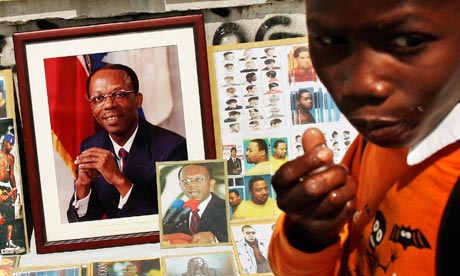https://www.guardian.co.uk/world/2011/mar/17/jean-bertrand-aristide-haiti-return
Exiled former president on flight to Port-au-Prince accompanied by Hollywood actor and campaigner Danny Glover
Isabeau Doucet in Port-au-Prince and David Smith
guardian.co.uk, Thursday 17 March 2011 19.27 GMT

Jean-Bertrand Aristide, the former president of Haiti, is expected to end seven years of exile by touching down in Port-au-Prince on Friday, defying Barack Obama‘s concerns that his return could jeopardise the country’s election.
Aristide left his base in South Africa, accompanied by the Hollywood actor and campaigner Danny Glover, who is chairman of the TransAfrica social justice forum.
Such are Obama’s misgivings that he called Jacob Zuma, the South African president, to discuss the matter, according to US National Security Council spokesman, Tommy Vietor.
“The United States, along with others in the international community, has deep concerns that President Aristide’s return to Haiti in the closing days of the election could be destabilising,” he said.
“President Obama reiterated that view in a call with President Zuma the other day … along with his belief that the Haitian people deserve the chance to choose their government through peaceful, free and fair elections [on 20 March].”
US state department spokesman Mark Toner has acknowledged Aristide’s right to go back to Haiti, but said returning this week “can only be seen as a conscious choice to impact Haiti’s elections”.
Aides say Aristide fears the election winner may reverse the long-awaited decision to allow his return – both candidates are rightwingers long opposed to him. Aristide’s lawyer, Ira Kurzban, said: “He is genuinely concerned that a change in the Haitian government may result in his remaining in South Africa.”
Kurzban claimed that even at the 11th hour the US was exerting pressure on South Africa to delay Aristide’s flight, which took off on Thursday night from Johannesburg’s Lanseria airport.
The former priest and liberation theologist’s diplomatic passport was delivered last month, and the South African cabinet minister Collins Chabane said the government could not be held responsible for whether he stays or goes.
“What I should stress is that we are not sending former president Aristide to Haiti,” Chabane said.
“He was given the passport by the government of Haiti and we can’t hold him hostage if he wants to go.”
Glover arrived in South Africa on Thursday to escort the ousted leader home. He asked why the former dictator Jean-Claude “Baby Doc” Duvalier could return to Haiti unhindered – as he did in January following 25 years in exile – and yet not the twice democratically elected Aristide.
“People of good conscience cannot be idle while a former dictator is able to return unhindered [and] a democratic leader who peacefully handed over power to another elected president is restricted from returning to his country by external forces,” Glover wrote on the TransAfrica Forum website.
Glover and nine others recently wrote to Zuma urging him to “assist the Aristides in making their transition as soon as possible” as “all the last remaining obstacles to the Aristides’ return have been removed”.
Aristide, who emerged as a leading voice for Haiti’s poor in a popular revolt that forced an end to the Duvalier family’s 29-year dictatorship, remains hugely popular in the country. Some predict his return will brings tens of thousands of supporters to the airport.
He has said he will not be involved in politics in Haiti and wants to lead his foundation’s efforts to improve education in the impoverished Caribbean nation devastated by an earthquake last year.
His political party has been excluded from running in the election, which many Haitians consider illegitimate. The two remaining candidates received just 10% of the first-round votes between them.
This would be Aristide’s second return from exile. He was ousted by a military coup in 1991 but Bill Clinton, when he was president, returned him to power in 1994 following a US intervention that forced out the military regime.
Aristide fled Haiti again in February 2004, leaving before dawn on a US plane as rebels approached the capital. He accused American diplomats of having kidnapped him, charges that Washington denied.
He continues to have powerful enemies in Haiti. The same forces that made him leave in 2004 will consider his return to be a threat, and foreign powers that bankrolled the elections will also see him as a destabilising influence.
The first round was marred by massive fraud, with voters unable to find their names on electoral rolls and polling stations closing early – or not opening at all. Voter turnout was at a 60-year low – only 22.9% of those registered actually cast ballots. In areas most affected by the earthquake the figure was half that, and it is not yet clear the situation will be vastly improved this time.